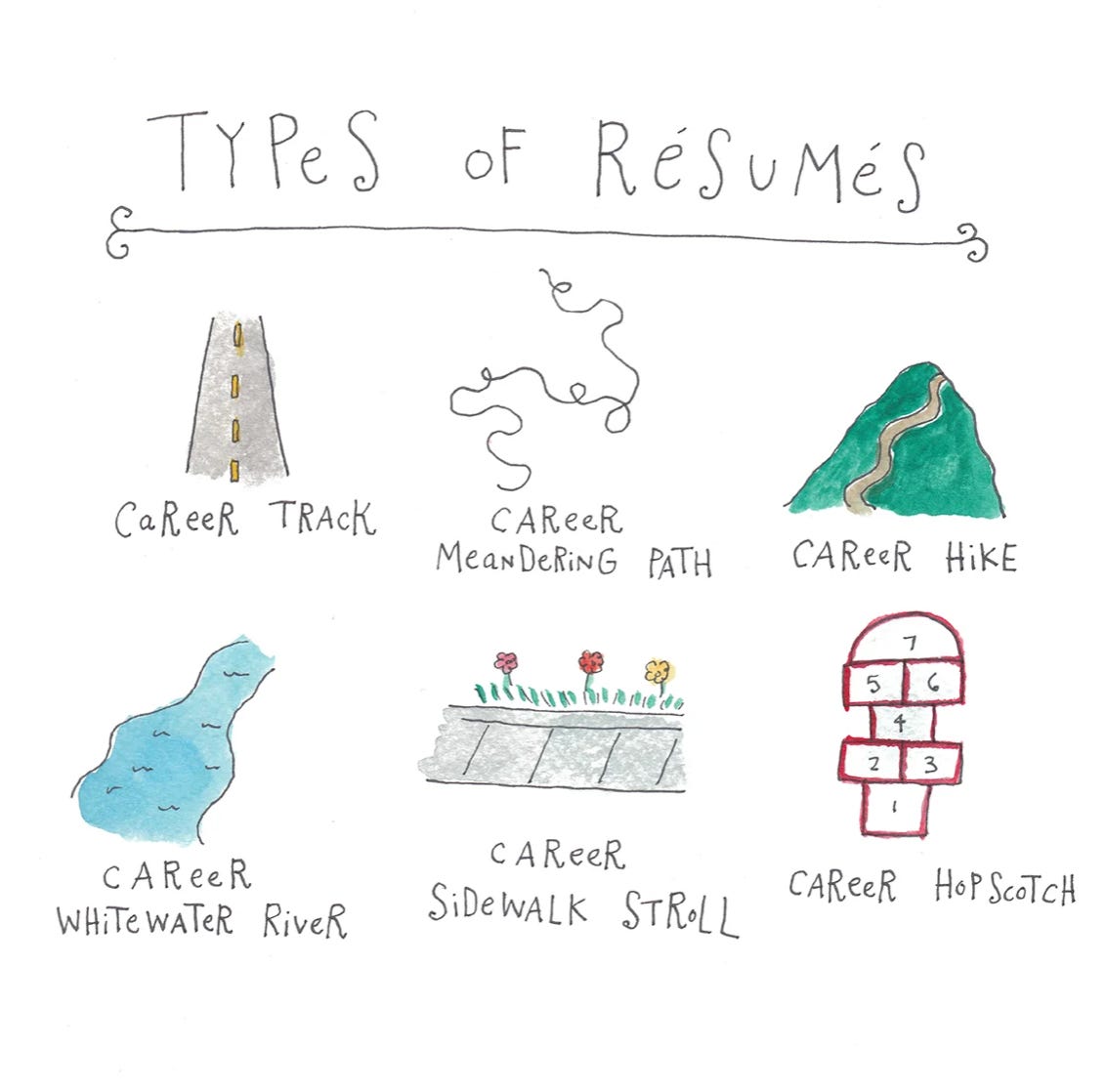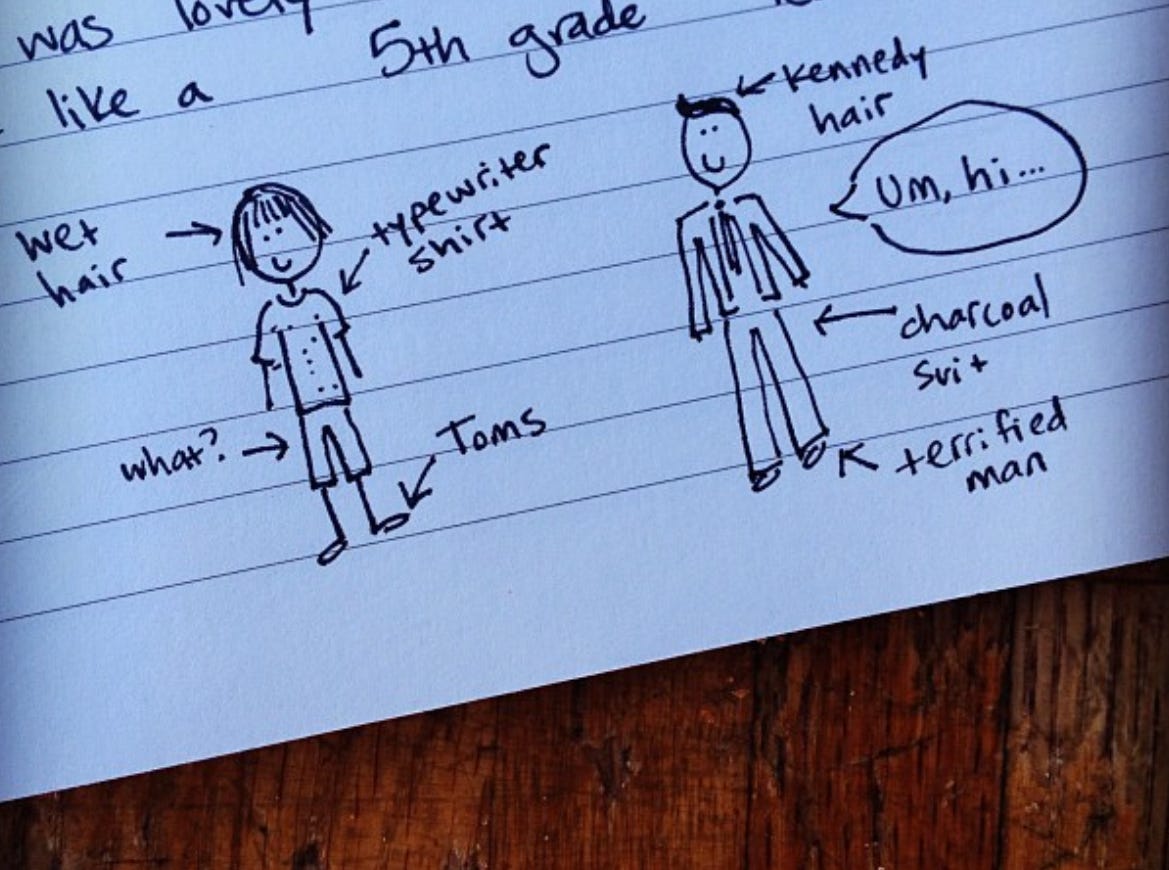The languages you speak
And how to be more comfortable on earth
Hello from my sickbed! (Please imagine I am dipping my quill in ink to write this newsletter by candlelight, my frail wrist adorned with the ruffled cuff of a Victorian nightgown.)
While the WHO has just declared Covid a non-issue, it is still very much an issue in my lungs at the moment. WHO would have thought!?
Ahem, cough cough, ahem:
When I lived in Washington DC, I felt like everyone had their life together except for me. Depending on one’s subculture, DC can seem like a city oriented toward the linear success of traditional careers—the ones that provide insurance and involve standing desks and pencil skirts and “circling back on this.”
I had no such thing.
I took refuge in the words of Cheryl Strayed: You don’t have a career. You have a life.
But lives…don’t pay rent. Nor do they have much to say for themselves at dinner parties when someone dutifully asks, “What do you do?” in the same tone that one might as, “Why are you worth my time?”
“I work at a store, I want to be a writer, I do yoga, and I cook myself a fabulous dinner every night,” my friend advised me to reply with my chin held high.
Yet at some point I just decided to stop being in situations where I’d be surrounded by Career Talk; it began eroding my self-worth to be on the defense about my unplanned, uninsured life.
That’s when I discovered the world of….Going Out Dancing.
I thought Going Out Dancing was a phase of life that I had missed, or something that happened in foreign countries, or a weekend activity for people who had completely different personalities than I.
Turns out, it was available for me, too, and I started doing it a few times a week. I quickly began learning all sorts of new languages: the names of DJs, the origins of song samples, the distinct vibe of each club.
Obviously, I was safe from Career Talk at the clubs. It wasn’t just that my fellow Tuesday night Go-Out-Dancers weren’t interested in day jobs; the language of it literally didn’t exist in this culture: a culture which was also very much at home in DC (the birthplace of several sub-genres of hip hop, funk, soul, and punk).
While those Career People had the days of DC, we had the nights.
Then I reframed my insecurity around chatting about career tracks: There wasn’t anything wrong with my life; I was simply uncomfortable with a language I didn’t know. (Flashbacks to my host family in Kobe talking over each other in Japanese during dinner while I sat there wondering if I could slide under the table without them noticing.)
Once I mastered the language of dance music, I became okay with not having a fancy career because I had something else that I valued so much more. I picked up other tongues too: that of the local art community, my samba lessons, the trails of Rock Creek Park.
Now that I had fluency elsewhere in cultures that felt more like home, I could sit among the career gibberish and just smile, knowing that I didn’t have to understand or contribute much. I was going out dancing later. I’d be able to talk up a storm with no accent in the local language I knew best.
I’ve been thinking about this Going Out Dancing time of life as I sit with my current roster of insecurities.
99% of the time, I feel utterly delighted with my life and perfectly comfortable with my terribly imperfect existence. That’s why I’m taken by surprise during rare moments when I’m reminded of the first day of 7th grade, when I enter a room and immediately wish to moonwalk right out of it, praying very hard to disappear from off this earth for the next few hours.
This feeling of desperate insecurity usually occurs at any place where the key to get in is some sort of external validation: a job title, a professional connection, an award, or (gag) a number of “followers” (the creepiest term?). At many of these events, I feel immediately uncool and unwanted, like my presence has just taken the whole scene down a notch.
So I remember what I taught myself to get through excruciating DC happy hours, years ago: I just don’t speak this language.
And that’s nothing wrong with me, and nothing wrong with them either (because we all know how quickly insecurity transforms into judgment). I just speak a different language.
As soon as I arrived in Panama City a few weeks ago, I was reminded of one of my highest levels in the DuoLingo of Life: I am very good at being in a foreign country. I can identify the non-scammer in the taxi line and confidently negotiate a rate, I can elbow my way out of prickly situations, I can make friends through charades, and I can ALWAYS find a bathroom no matter what.
I was telling my fellow nomadic Spanish teacher about this and she replied, “See, it doesn’t matter that you can’t do your taxes! You’re good at other things!”
SHE’S RIGHT!
(It actually does matter.) (But she’s still right.)
I have this one specific skill that barely ever comes up in my normal life, but I’m really really good at it! I may not speak the language of a W-9 form but I do speak the language of figuring out how to walk across a multilane highway in Panama City and let me tell you it is an Everest-level accomplishment!
Same revelation I had in college when a customs agent at the Guatemala airport told me I didn’t have an accent in Spanish. I ecstatically wrote in my journal: I don’t have a job, I don’t have a major, I don’t have a boyfriend, I don’t have a plan, BUT I DON’T HAVE AN ACCENT!!!
I used to walk into dance clubs in DC and feel an instant sense of proud belonging: I know what I’m doing here. I had the uniform, I understood the space, I knew the dances, I got the culture, I spoke the language. I felt as valuable and intelligent as a piece of sock lint at those parties full of professionals, but at the club I could shine. Or at least my sequin jacket could shine.
Now, I feel that way about other places. I could probably walk into most yoga studios and feel comfortable (except that one in Manhattan). I’m better at public speaking than public-most-other-things and I feel relaxed when I walk on stage. In the application for my chaplaincy internship, I wrote that I’m not anxious walking into a hospital and have no problem talking about death (the only qualification I could bring to the table, but it seemed like an important one). And I’m pleased to announce that I finally don’t feel overwhelmed when I walk through the spice aisle of the grocery store.
To identify the languages you speak, think about the spaces that you are comfortable walking into.
I smooth out my insecurities by thinking in terms of the Life Languages I speak and the ones I simply don’t (e.g. sports isn’t happening in this lifetime).
It also gives me permission to dabble in foreign tongues that may otherwise overly intimidate me. As soon as I start learning a new actual language (ask me how many phrasebooks I’ve bought throughout the years), I’m very obviously starting from the beginning so I’ll be pleased as punch just to be able to converse in one or two words.
“SHUKRAN!” I will far too enthusiastically say to any Arabic-speaker who I’d like to thank. And if I some day get to use the few phrases I still remember from a year of taking Russian, you best believe you’ll never hear the end of it.
So maybe I can walk into the spaces of tax-doing and professional-mingling and sports-chatting and all the many worlds where I don’t feel welcome, and approach with an open “I know just a couple phrases” mentality.
I wish I’d known this in DC, before I discovered the dance clubs which were always there alive underground, beneath the scary office buildings. I wish I’d known that I could say, “I’m not sure I understand what you’re saying,” and it would be okay, because I spoke other languages that interested me more.
Now I think about it as I envision the spaces I still don’t feel comfortable walking into, but would like to.
I also (very often!) think about how beautiful it is that, despite the internet’s shortening of our distances, the world still holds an inexhaustible amount of actual languages and thus an inexhaustible amount of ways for people to legitimately express themselves. Every language has syllables and sounds that are nearly impossible for other speakers to mimic, but so enjoyably challenging to try.
There is no shortage of spaces and languages that may always seem out-of-reach. But there’s no shortage of ways to get comfortable in this world if you’re willing to look around—even underground if you have to.
My linguistic prowess has changed over time; I can only remember a few basic words now from Going Out Dancing. But I’m steadily incorporating other ones from the languages of Nature World, Cooking World, Living-Joyfully-in-Grief World, and dabbling in others to feel more at-home on this oddball glorious earth.
Which spaces do you enter with a sense of pride and belonging? Which languages do you definitely not speak? Are you spiritually and emotionally capable of working on financial things (unlike me)? Which languages would you like to dabble in this year?










Gorgeous and true. Reminds me of a friend who says—instead of “I don’t know”—“I guess I haven’t learned that yet.” So far I speak used-to-do-ballet and can-read-a-river, as well as preacher-talk, midlife-mom-menopause, and book-nerd; but lately I’m finding my fluency in the language of loss and the grammar of grief. Hope you speak over-Covid soon and get back to dancing!
I speak the career language very well, but I will never speak the parenting language. Similar to your experience with career track conversations, I have a really hard time conversing in environments where folks are on the parent track. Something that my therapist said the other day that was really helpful was to notice when I'm feeling left out and figure out whether that's coming from an actual value or from societal expectations/expectations of a subset of the group you're in. If it's the latter, then I have to double down on my sense of self and my confidence in my unique path. It can be hard to push against the current, and it's something that's super present for me lately!